Force and motion -> space exploration
Space Exploration
Space exploration is the investigation and study of outer space. It involves the discovery and understanding of celestial structures, such as stars, planets, moons, comets, and asteroids, as well as the exploration of outer space using manned and unmanned spacecraft.
Why Explore Space?
Space exploration helps us understand the universe and our place within it. It also drives technological advancements and scientific discoveries that benefit life on Earth.
Key Milestones in Space Exploration
- 1957: The Soviet Union launches Sputnik, the first artificial satellite, into space.
- 1961: Yuri Gagarin becomes the first human to travel into space.
- 1969: Neil Armstrong and Buzz Aldrin become the first humans to walk on the moon.
- 1971: The first space station, Salyut 1, is launched by the Soviet Union.
- 1998: The International Space Station (ISS) is launched, representing a collaboration between multiple countries.
Types of Space Exploration
Space exploration can be categorized into two main types:
- Robotic Exploration: This involves sending unmanned spacecraft, such as rovers and probes, to explore celestial bodies and collect data.
- Human Spaceflight: This involves sending astronauts into space to conduct research, assemble space stations, and perform extravehicular activities.
Future of Space Exploration
The future of space exploration includes ambitious plans to send humans to Mars, establish permanent bases on the moon, and continue exploring the outer reaches of our solar system and beyond.
Study Guide
.◂Science Worksheets and Study Guides First Grade. Force and motion
Study Guide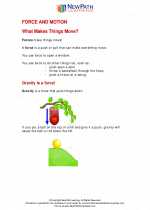 Force and motion
Force and motion  Worksheet/Answer key
Worksheet/Answer key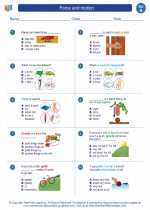 Force and motion
Force and motion  Worksheet/Answer key
Worksheet/Answer key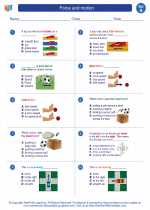 Force and motion
Force and motion  Worksheet/Answer key
Worksheet/Answer key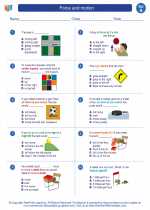 Force and motion
Force and motion  Vocabulary/Answer key
Vocabulary/Answer key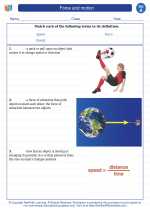 Force and motion
Force and motion 

 Worksheet/Answer key
Worksheet/Answer key
 Worksheet/Answer key
Worksheet/Answer key
 Worksheet/Answer key
Worksheet/Answer key
 Vocabulary/Answer key
Vocabulary/Answer key

The resources above cover the following skills:
Concepts of Physical Science: A student should understand and be able to apply the concepts, models, theories, universal principles, and facts that explain the physical world. A student who meets the content standard should:
Develop an understanding of motions, forces, their characteristics and relationships, and natural forces and their effects.